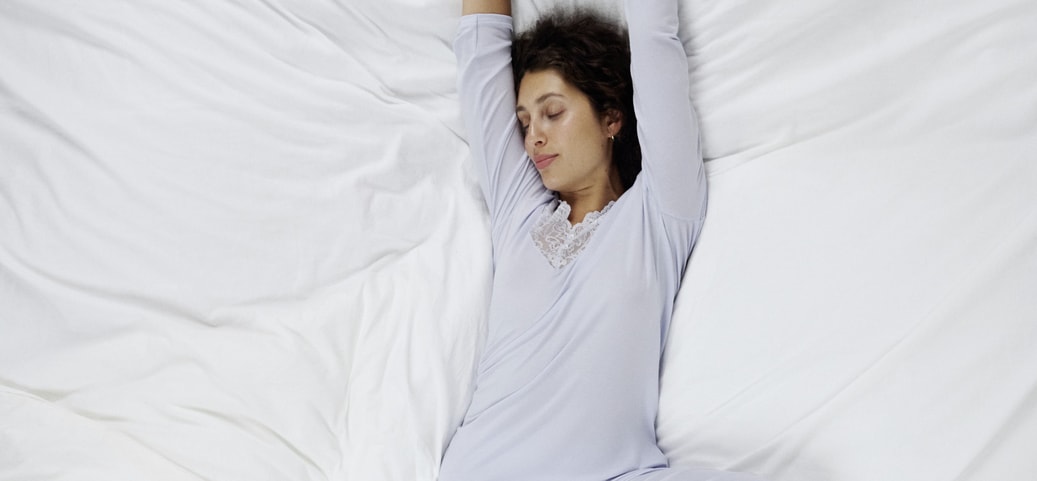What to do against constant oversleeping? 5 helpful tips
If you're always running to work at the last minute, you most likely have problems with time management in the morning. Oversleeping is often the cause of this - for example, because the alarm clock has not been heard or the snooze button has been pressed a few too many times. Constant oversleeping is not only unpleasant, but can also have serious consequences in the long term, especially if you constantly miss important appointments. We have 5 tips for you to improve your sleep hygiene and your morning time management so that you can always get up on time.
by CALIDA
December 11, 2024•4 min reading time

Tips against oversleeping: How to start the day refreshed and avoid morning stress through better sleep.
Table of Contents
Tip 1: go to bed early enough and always at the same time
Our first tip to avoid oversleeping is as simple as it is ingenious – after all, having a regular sleep schedule and getting enough shut-eye are the key to getting out of bed more easily in the morning.
First of all, you should know that the average sleep requirement of an adult is about seven to eight hours. If you regularly sleep less than this and often have problems getting up, you might not be getting enough sleep – and this could be the reason why you are constantly oversleeping.
To get to the root of the problem, you should go to bed earlier over a longer period of time and maintain this sleep schedule, ideally also at the weekend. You’ll soon notice that getting up in the morning is no longer so hard for you – you might even wake up on your own a few minutes before your alarm goes off.
Tip 2: use the right alarm clock
Mobile phone alarm clocks, radio alarm clocks, analogue old-school alarm clocks, sunrise alarm clocks, etc. – if you’re constantly oversleeping and haven’t yet considered your choice of alarm clock, it’s a good idea to do so.
Most of us probably use our mobile phone alarm clock, which plays the same sound every morning – many even opt for pleasant melodies, birdsong or their favourite music. This may very well be the right choice for people who have no problems getting up and want to start the day feeling positive.
But for those who oversleep easily, you run the risk of simply continuing to sleep with these pleasant sounds. This is where you need to bring out the big guns: whether it’s a shrill analogue alarm clock without a snooze function or a radio alarm clock that wakes you up every day with different stimuli – the right alarm clock for you is a very individual thing.
Tip: place your alarm at the other end of the room for a sure-fire way to get you out of bed. If it also makes a very loud or unpleasant sound, you will be forced to get up to switch off your alarm clock. Instead of lying down again, it’s best to start the day right away.
Alarm clock for winter and for early risers
If you need to be at work very early in the morning or often oversleep in winter, a sunrise alarm clock could be just the thing for you. This is because while darkness stimulates the production of the sleep hormone melatonin, daylight releases happiness hormones that make us feel cheerful and awake. A sunrise alarm clock mimics the rising sun while playing your wake-up melody. It ensures that you wake up gently but on time.
Tip 3: avoid distractions that keep you awake in the evening
One of the most common reasons for constantly oversleeping is too many stimuli that keep you awake in the evening. Smartphones, tablets and TVs, in particular, have become an integral part of many people’s evening routine – and this is precisely where the problem lies. The blue light from these devices inhibits melatonin production. As a result, you get tired later and find it harder to fall asleep.
To avoid this, it’s advisable to refrain from using any screens at least an hour before going to bed. You can adjust your room lighting by switching from bright ceiling lamps to indirect light sources or candlelight.
Focus instead on relaxing activities that promote sleep. Reading a light-hearted, funny book, doing relaxation exercises such as meditation or yoga, or listening to soothing music have a particularly calming effect. Practising a regular evening routine such as diary writing or taking a warm bath can also signal to your body that it’s time to relax.
The fewer distractions, the easier it will be for your body to calm down and sleep soundly. This, in turn, ensures that you wake up more refreshed and well-rested the next morning – and less tempted to simply press the snooze button again.
Tip 4: take measures to sleep more soundly
Constantly oversleeping is often also a sign that you’re experiencing poor sleep quality. If you find it difficult to get out of bed in the morning, you may not only have had too little sleep, you may also have slept poorly – perhaps you kept waking up or didn’t get enough deep sleep. Here are a few tips to improve your sleep hygiene and help you sleep more soundly:
Optimise your sleep environment: having a comfortable environment to sleep in is essential for getting a restful night’s sleep. Make sure your bedroom is tidy, quiet, dark and well ventilated. Ideally, the temperature should be between 16°C and 18°C. Breathable pyjamas, a comfortable mattress and cosy bedding that is made for the season are also key.
Physical relaxation: a relaxed body sleeps better. To achieve this, you can try targeted relaxation exercises such as a body scan, progressive muscle relaxation or breathing exercises to let go of the stress of the day.
Adapt your diet: your eating habits also have a major impact on how well you sleep. Avoid eating heavy foods or consuming caffeinated beverages such as coffee, cola or energy drinks just before bedtime. Instead, a tea with soothing herbs, such as chamomile or lavender, can help get you ready for sleep.
Tip 5: reduce your morning tasks
Anyone who rushes around the house in the morning, constantly looking at the clock and trying to do several things at once, will quickly perceive the morning as stressful and negative. This feeling can lead to people deciding – sometimes even unconsciously – to sleep for a few more minutes, which often ends in their oversleeping.
The solution? Reduce the number of tasks you do in the morning to a minimum. Instead, complete the things you need to do – like preparing breakfast, packing your bag or choosing what to wear – the night before. If you have everything ready the night before, you will have more time in the morning to get ready and start the day in peace, and getting up will be easier for you.
Another tip: in addition to being well prepared, you should also develop a specific morning routine that you repeat every day. Having a fixed structure will help you to get through the morning without rushing – and at some point, you’ll know exactly which tasks require how much time. This way, you can conserve your energy for the day and avoid constantly oversleeping.
Discover more interesting blog posts:


